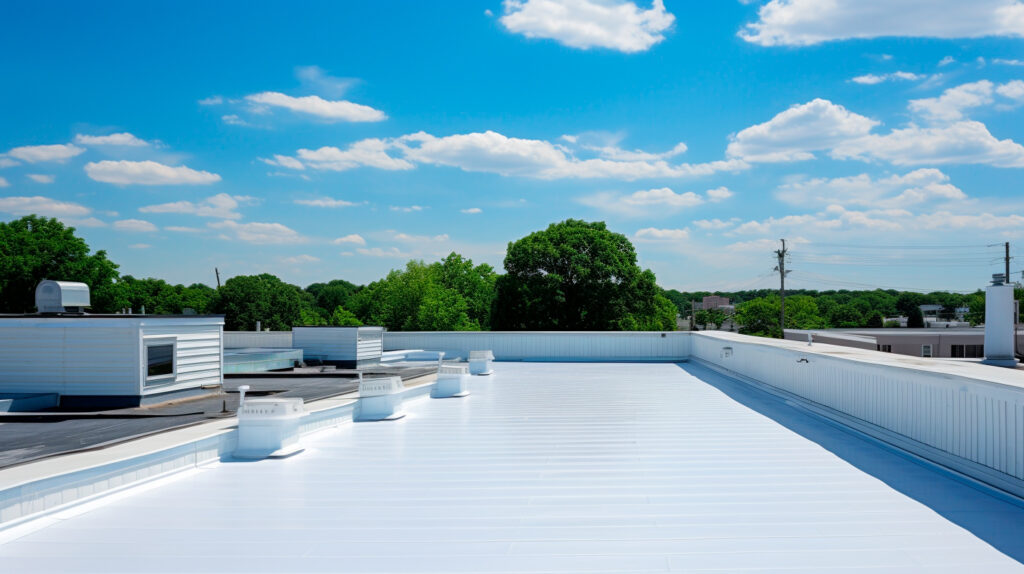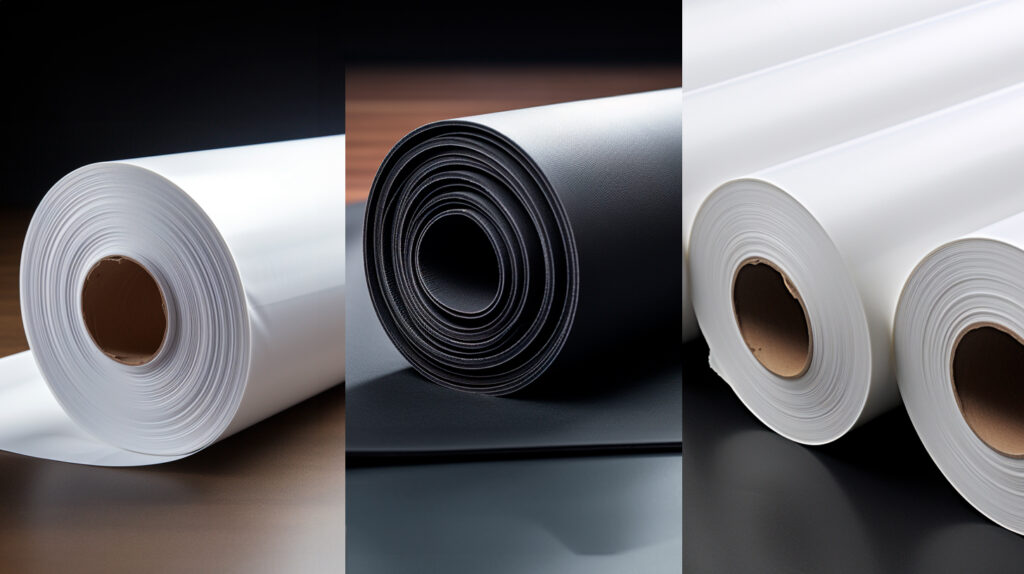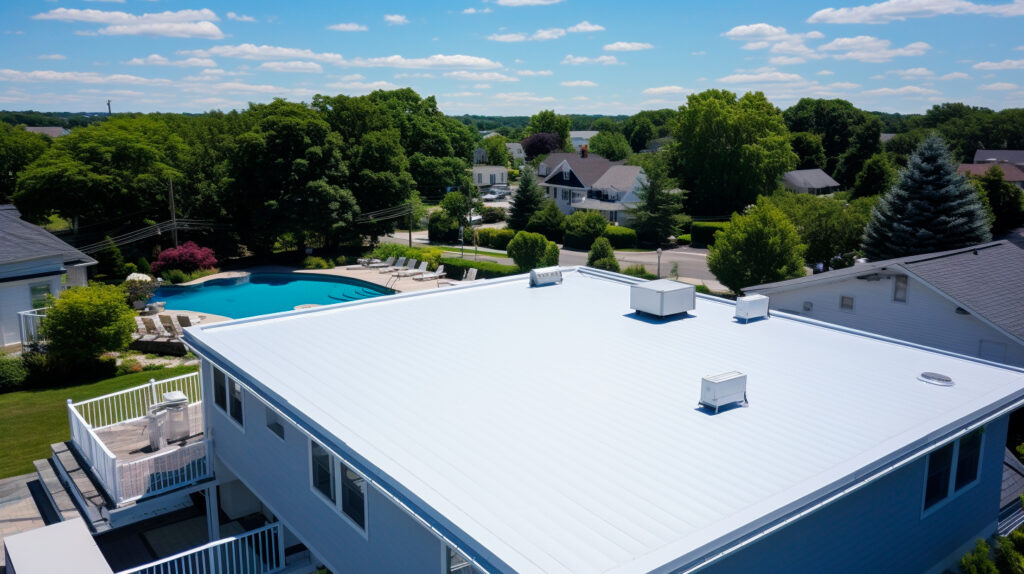PVC Roofing in Boston, Massachusetts: Essence & Price
Reading Time: 5 minutesBoston, Massachusetts, is no stranger to eccentric weather. Your roof’s strength determines your safety in heavy rain or extensive snowfall.
PVC roofing membrane is completely waterproof. Plus, it helps you keep the premises cool during a hot summer day, which is also a probable scenario in this area. However, particular parameters can still make this roofing material unfitting for your roofing project.
Defining PVC Roofing

PVC (polyvinyl chloride) is the oldest member of the single-ply roofing membrane community, which also includes EPDM (EP-diene rubber) and TPO (thermoplastic polyolefin). They share a form of single-ply membrane you put on top of your roof system. But, of course, they also possess different traits that define them.
| Types of Roofing | Roof System Category | Roofing Material | Definition |
| Flat & low-slope roofs | Single-ply membrane | PVC (polyvinyl chloride) | PVC roofing membrane comes in various colors, and its defining trait is its enhanced durability. |
| TPO (thermoplastic polyolefin) | TPO membranes don’t accumulate heat because their white surface reflects the sun’s rays. | ||
| EPDM (EP-diene rubber) | The EPDM membrane is black. Therefore, it absorbs heat. |
A Note on Terminology
So, now you know the difference between EPDM, PVC, and TPO roof systems. Yet, vinyl often confuses people because they can’t determine whether vinyl and PVC are the same material. The short answer is yes, they are. If you look closer, you’ll notice that polyvinyl chloride has vinyl right in the name.

Inherent Features of PVC Roofing
The most effective way to discover the level of your roofing material’s cost efficiency is to compare the average price against the estimated lifespan, ease of installation or maintenance, and other vital qualities. Hence, exploring PVC’s essential characteristics is an appropriate place to start.
Installation
Generally, PVC roofing systems are easy to install. However, the difficulty level will vary depending on the selected installation method and the sheet’s thickness.
Available Installation Methods
| Fully adhered | If you prefer to avoid penetrating your roof with fasteners, you can attach the membrane sheets with a strong adhesive. |
| Mechanically attached | This way is more complex and demanding. You have to use special screws and plates to put the construction together. As a result, you’ll secure advanced protection from high winds. |
| Induction Welded | Induction welding (fusing) implies adhering membranes to the plates with specific coating using heating equipment. In this case, you benefit from lower labor costs plus fewer plates and fasteners. |
Important Reminder
Of course, you must attach the membrane only after placing a deck and insulation. In addition, due to the nature of membrane roofing, you can install it only on flat or low-slope surfaces. For conventional and steep slopes, you have no choice but to consider other options.
Membrane Thickness Selection
| Minimum | In between options | Maximum |
| 40 mil (0.4″) | 41-89 mil (0.41-0.89″) | 90 mil (0.9″) |
Professional Tip
Generally, a considerable thickness means high-quality material due to its capacity to survive various deteriorating impacts for longer.
Bonus Points
- Membrane is a very lightweight material. Therefore, the installation process won’t drive you or construction workers to exhaustion. Furthermore, any building can carry such a small load.
- PVC can be incredibly versatile when it comes to the extent of its flexibility. Thus, you can order rigid, semi-flexible, or flexible sheets depending on the shape of your roof.
Longevity
All single-ply membranes are famous for their durability. However, the PVC roofing system has earned a reputation as the most waterproof family member. Its estimated lifespan is more than 30 years. In addition, it can withstand multiple factors that would be lethal to other materials.
- Its impermeability is beyond expectations. Hence, you don’t have to worry about rust, rot, moss, or mold. Leaks and cracks also won’t bother you with this material.
- PVC is also immune to the damaging effects of the sun’s rays. Its surface reflects UV light and heat.
- The most appreciated benefits of PVC roofs are chemical, grease, and fire resistance. Plus, its fire-resistant capabilities enable it to cope with lightning strikes.
Word of Advice
If your budget allows, opt for a PVC membrane with polyester reinforcement. It makes the roof system more resilient to wearing, tearing, and general fatigue. Moreover, this enhancement demonstrates better adhesion properties and wind uplift resistance capacity.
Cautionary Sidenote
People choose PVC roofing because of its ability to overcome the effects of the most severe weather and climate manifestations. Still, low temperatures make it more vulnerable to shattering and less capable of sustaining punctures.
Appearance
Of course, as a roofing material, PVC doesn’t show the same level of aesthetic appeal as timber or natural stone. Yet, unlike its counterparts in the community of single-ply roofing, PVC membranes come in a wide selection of colors, including the most common ones like white, black, gray, brown, red, or green. Therefore, you can easily find the one that matches the style of your building.
Plus, discoloration poses no threat to PVC due to its unique properties. As a result, your roof will look bright even after years of service. However, dirt will still be visible on the plain surface. Thus, you should prepare to clean it regularly or place it somewhere out of sight.
Opportunities for Design Upgrades
If you consider making your roof more practical or pleasing to the wandering eye, add vegetation or solar panels over your PVC membrane.
Maintenance
It is chemically resistant. In addition, it is fireproof and waterproof. Furthermore, its ability to withstand high winds is also impressive. Therefore, you can call this type of roofing maintenance-free, and it won’t be an exaggeration.

However, you still have to clean it and monitor its condition regularly. Yet, it’s better to perform inspections and repairs during warm weather. The membrane will be less fragile, and you won’t catch a cold.
Tricky Detail
Indeed, your PVC roofing will serve you at least 20 years. But it doesn’t mean the membrane will remain intact for the whole period. You’ll notice the first signs of decay after ten years. Unfortunately, the replacement sheets won’t be as long-lasting as the original ones.
Energy Efficiency & Sustainability
As energy bills go high, energy efficiency becomes a crucial parameter to consider when you search for a perfect roofing material. PVC roofing helps you keep the cooling cost down by deflecting the sun’s heat and UV radiation. It also prevents heat loss, provided that the sheets have proper thickness. As a result, PVC roofing membrane is suitable for a variety of spaces:
- commercial buildings;
- living spaces (e.g., bedrooms);
- extend roofing (e.g., garage or patio).
Of course, it’s not a vital requirement, but it’s always heartwarming to know that the materials you employ are recyclable. When you opt for PVC roofing, you make an eco-friendly and sustainable choice.
PVC Roofing Prices in Boston, Massachusetts
PVC roofing suits the ever-changing climate of Boston, Massachusetts. However, there are more affordable solutions. First, PVC is the most luxurious out of single-ply membranes. Plus, Boston is an expensive area to live in.
Of course, prices fluctuate drastically over time. In 2023, the price range for PVC roofing in Boston is $8.50 to $14.50 per square foot.
To Sum Up
PVC roofing is almost impenetrable. The benefits of PVC include its extensive longevity and durability, accompanied by its low maintenance. However, if your budget calls for a more affordable option, you should explore the alternative types of single-ply roofing.
Denis is the driving force behind ID Flat Roof, a leading company in Boston specializing in flat roof repair and installation for over 20 years.
Expertise:
Denis excels in PVC, TPO, EPDM, and rubber roofing. His meticulous approach ensures quality and customer satisfaction.
Innovation:
Denis incorporates cutting-edge solutions like skylights and solar PV roofing.



